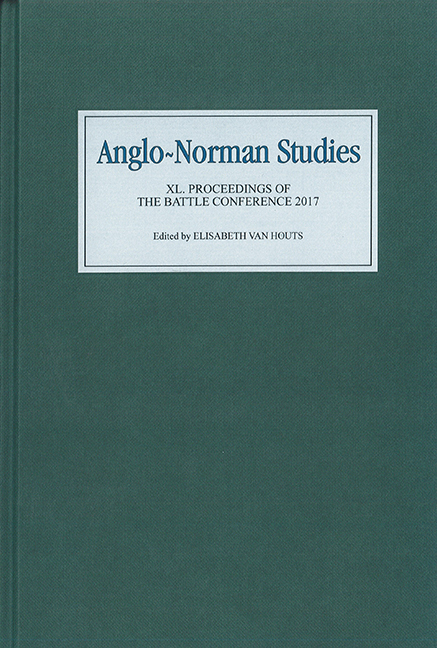Book contents
- Frontmatter
- Contents
- Illustrations and tables
- Editor's preface
- Abbreviations
- The R. Allen Brown Memorial Lecture, 2017
- English Kingship: the View from Paris, 1066–1204 (The R. Allen Brown Memorial Lecture, 2017)
- The R. Allen Brown Memorial Lecture, 2016
- The Marjorie Chibnall Memorial Essay, 2017
- Note: A Micro-Economy of Salvation: Further Thoughts on the ‘Annuary’ of Robert of Torigni
English Kingship: the View from Paris, 1066–1204 (The R. Allen Brown Memorial Lecture, 2017)
from The R. Allen Brown Memorial Lecture, 2017
Published online by Cambridge University Press: 17 July 2018
- Frontmatter
- Contents
- Illustrations and tables
- Editor's preface
- Abbreviations
- The R. Allen Brown Memorial Lecture, 2017
- English Kingship: the View from Paris, 1066–1204 (The R. Allen Brown Memorial Lecture, 2017)
- The R. Allen Brown Memorial Lecture, 2016
- The Marjorie Chibnall Memorial Essay, 2017
- Note: A Micro-Economy of Salvation: Further Thoughts on the ‘Annuary’ of Robert of Torigni
Summary
In the summer of 1201, King John of England visited Paris. His visit is described for us by Rigord, the biographer of Philip Augustus:
John King of England came into France, received with honour by King Philip and most gloriously welcomed in the church of Saint-Denis with hymns and praises and solemn procession. The King of the Franks then led him to Paris, where he was received by the citizens with remarkable reverence and honour, lodged in the royal palace with all things devotedly supplied for him. All the wines of the lord King were placed at his disposal, granted liberally to him and his men to drink. Moreover, precious gifts of gold, silver, various garments, Spanish destriers, palfreys and other more precious presents were liberally bestowed by Philip upon King John of England. And thus in peace and friendship, having received license from King (Philip), he bid his farewells.
Robert of Auxerre describes the same event in less elaborate terms:
King John came to Paris, a city famed as the seat of royal dignity, but more famed still as the meeting-place of pre-eminent doctors in all sciences. There he was received with great honour and procession by the King together with clergy and people.
There are already points of emphasis here: Paris as a place of solemn procession, of learning and liberality, of wine and song; Paris as a place of abundance, where all visitors to the French king's court were entertained luxuriously and free of charge. Already we find Paris itself personified as a symbol of la douce France, of all things civilized and sophisticated. Parisian accents are themselves more urbane than those of Rouen or Poitiers. By Parisian standards all else will be judged. The kings ruling from Paris claimed a dignity, a liberality, and a command over both religion and learning, that set them apart from any mere king of England. In all of this, there was much striving after what was intended to appear effortless superiority. Louis VII is said to have vouchsafed to Walter Map that, where the King of England might boast of wealth and power: ‘We in France have nothing, save bread and wine and joy’. But such simplicity was itself as sophisticated and hard-earned as the rustic antics of the court of Marie-Antoinette.
- Type
- Chapter
- Information
- Anglo-Norman Studies XLProceedings of the battle conference 2017, pp. 1 - 24Publisher: Boydell & BrewerPrint publication year: 2018

